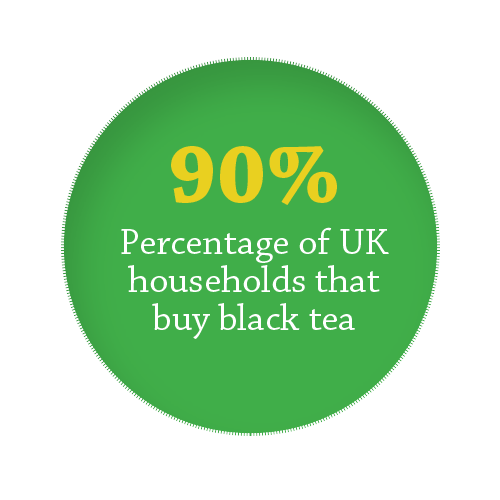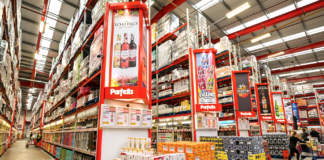Is a cup of tea with cow’s milk all people want in a hot drink? Toby Hill reveals the products to stock to take advantage of changing tastes
In retail and the on-trade, buying habits are being shaped by trends towards consumption that is individualised in terms of health, ethics and a desire to try adventurous new flavours.
How do you react to the changes in the hot drinks category? This guide will serve you all you need to know.
Innovating on tea
 The days when Brits only drank black tea served with a splash of milk are long gone. Corner stores and cafés now need to offer a wide range of infusions, and the established brands are investing heavily in new products to meet this demand.
The days when Brits only drank black tea served with a splash of milk are long gone. Corner stores and cafés now need to offer a wide range of infusions, and the established brands are investing heavily in new products to meet this demand.
“Research shows that 49% of customers who have seen new types of tea in the past 12 months have tried them,” says Heather Bushell, senior business manager at Tetley’s. “We have been working hard to meet these new adventurous flavour preferences and trends towards premiumisation.”
At the forefront of this growth are green and herbal teas, Bushell adds: “29% of consumers expect to drink more green tea than they did a year ago and herbal teas are growing 10% year-on-year.”
Tetley’s expanded range of herbal teas encompasses flavours such as camomile, mint fusion, lemon & ginger and raspberry & pomegranate. It has also blended fruit and green teas to create variants such as lemon green tea and mango green tea. “These are key lines driving consumption, as we are seeing a move towards more diverse flavour variants,” Bushell says.
Another trend is consumers’ increasing health consciousness, which Bushell describes as a “cross-category interest”.
“Health has been a buzzword for the past five years, as everyone is looking for ways to improve their lifestyles,” she says.
Tetley’s has developed a range of vitamin-enhanced ‘super green teas’ to meet this demand. Vitamin B6 is added to blueberry & raspberry tea to provide an energy boost; vitamin C is added to lemon & ginger to strengthen the immune system; and selenium is added to mint tea to help the body detox.
Nevertheless, do not fully discount the importance of black tea. Noel Clarke, vice-president – refreshments at Unilever UK, says: “With 165m cups of tea drunk every day and 90% of households buying it, it is no surprise that after tap water, tea is the most consumed drink in the UK. ‘Normal’ black tea plays a big role in this category and shoppers tend to be loyal to brands, so it is important to reflect this by stocking the market leaders: PG Tips, Tetley and Yorkshire Tea. Tap water varies by region, which affects the taste of tea, so additional brands, such as Scottish Blend and Nambarrie, may also be popular in your area.”
Hot drinks on-the-go
Just as tastes in tea have expanded, Britain has become a nation of coffee lovers. Mintel data shows that since 2011, the value of the UK coffee shop market has risen from £2.4bn to £3.4bn.
This growth is not just good news for café owners. Mintel’s research shows that 44% of Brits buy hot drinks from non-specialists, such as hotels and convenience stores. This is particularly the case for on-the-go coffee, says Simon Baggaley, category manager at Nestlé Professional.
“Our research shows that of the 53% of people who buy coffee-to-go, only 40% buy coffee from a barista and 11% choose to buy from a supermarket, convenience store or forecourt,” he says. “This trend of hyper-convenience is driving diversity in the marketplace: we have come to expect our favourite food and drink anywhere, any time, at the swipe of a screen or the touch of a button.”
Nestlé’s range of coffee machines enables non-specialist outlets to offer just that: instant, on-the-go coffee tailored to their specific markets. A straightforward solution for convenience retailers is the Nescafé & Go machine. “This is a great-value option for retailers selling up to 20 cups of coffee a day,” Baggaley says. “It is easy to use and maintain, and its compact size means counter space is not sacrificed.”
Alternatively, at the top of the range, non-specialist outlets can match artisan coffee demand with the Nespresso Expert machine, with coffee ranging from espresso to lungo to Americano. Filling the gap between entry level and barista coffee is Nescafé Alegria, a machine offering up to 15 café-style coffees.
Convenience plus quality
Just as demand for coffee on the go is accelerating, Brits are increasingly selective when it comes to the coffee they consume at home. One trend is a desire for single-origin coffee, which comes from a specific growing area, says Barry Kither, sales and marketing director at Lavazza UK. “Today’s consumers want a story behind their brand they can relate to and be proud to support,” he says. “Single-origin coffee is becoming increasingly popular as consumers become aware of the provenance and origin of their food and drink.”
Lavazza is meeting demand for ethical coffee with its newly launched Tierra Origins range. Made with beans from Rainforest Alliance-certified plantations in Honduras, Brazil, Colombia, Java and Uganda, this “reassures consumers and outlets that their purchase is supporting the coffee-growing communities in which it has been sourced”, Kither adds.
Such trends towards premiumisation are not just affecting the market for ground coffee – manufacturers are working to match the convenience of instant coffee with the taste and quality consumers now demand. Lavazza is pursuing this goal with its Prontissimo Classico range: 90% instant coffee with 10% ground coffee for delicious, authentic-tasting coffee, with no need to wash fiddly cafetières or percolators afterwards.
Dairy-free
Maximising sales from hot drinks requires more than simply perfecting your range of teas and coffees. With ethical shopping growing in popularity – whether the focus is health, the environment, or animal welfare – more people are giving up cow’s milk and looking for non-dairy alternatives.
“Consumer demand for plant-based options is continuing to soar, both in and out of home, which points to a clear opportunity for wholesalers to capitalise on this trend in both areas,” says Vicky Upton, head of marketing at Alpro UK.
Retail sales of plant-based food and drinks are at an all-time high, with one in three households buying them every week and UK sales topping £301m. Alpro offers a range of products to meet this demand: Soya Original, Almond Original, Coconut Original and Oat Original. Upton suggests talking to retailers about them, as offering advice – such as to gently heat these products before adding them to hot drinks – can help build rapport and trust with customers.
Another opportunity lies in the on-trade, where the ease of going dairy-free means one in three consumers now regularly choose a plant-based alternative.
“Recent research by the Allegra World Coffee Portal found that requests for soya out of home have matched requests for semi-skimmed milk among the under-25s (11% and 12% respectively), meaning that plant-based alternatives are a great way to drive valuable millennial shoppers into coffee outlets,” Upton says.
As a result, Alpro has developed a ‘For Professionals’ portfolio of four plant-based drinks for baristas. The most recent addition is Oat, often recommended by baristas as the best dairy alternative.
Top tips

Greg Harvey
Channel controller,
Taylors of Harrogate
1. Traditional black tea with milk is still going strong. 61% of people say it is their preferred brew. So, black tea, such as Yorkshire Tea, should always be at the centre of a wholesaler’s offering. Stocking both original and decaf options will ensure that all consumers can be catered for.
2. Pricemarked packs (PMPs) give shoppers confidence in a small store’s pricing. The best pack sizes for wholesalers are 40s and 80s – they’re perfect for independents, proving value for money from the beginning of the transaction. Our Yorkshire Tea PMPs are available in both pack sizes and in small case sizes of five.
3. Paying attention to the location of customers’ stores is also recommended. If they are in an affluent area, premium products, such as Yorkshire Gold and our best-selling Rich Italian ground coffee, will appeal.
Viewpoints
 Stefano Laureti,
Stefano Laureti,
The Still Room,
Peckham, London
“Flat white is our most popular coffee, and dairy-free is a huge thing right now. We have oat, soy and almond, but oat definitely works best – it is especially good for steaming. It is sometimes people with intolerances, sometimes vegans, and often just for general health reasons. In terms of teas, ginger & lemon and green are our most popular lines.”
 Tomas Wawrzonk,
Tomas Wawrzonk,
The Victoria Inn,
Nunhead, London
“People like fresh and loose teas, and we have a range of them. English breakfast tea is the most popular by a long way and a lot of women come in for peppermint tea. Camomile, lemon & ginger and Earl Grey are all popular, too. People also request tea made with fresh mint, which we sometimes have in stock for making cocktails.”
 Mo Razzaq,
Mo Razzaq,
Premier Mo’s,
Blantyre, South Lanarkshire
“Our coffee machine is doing very well right now. We do a coffee and a cookie deal for £1.50, and that brings in customers and drives sales elsewhere in the store, too. It is especially popular in the morning, on the way to work, but we make sales right through the day, too.”
 Jimmy Patel,
Jimmy Patel,
Jimmy’s Premier,
Northampton
Hot drinks are very seasonal, so as the cold mornings begin to arrive, we will step up our range. For example, we have the Tassimo pods of latte and cappuccino, and as it gets colder we will introduce the hot chocolate, too. We are very much a black tea area, but we do keep green and peppermint for variety.”













